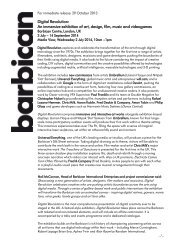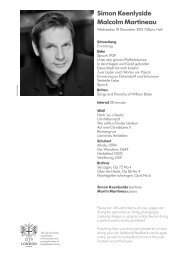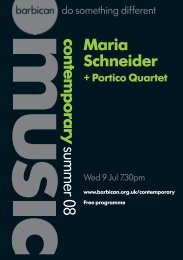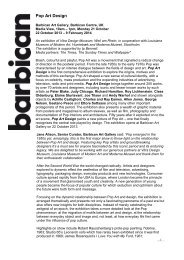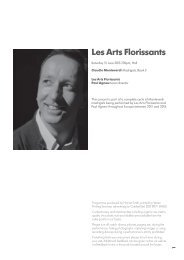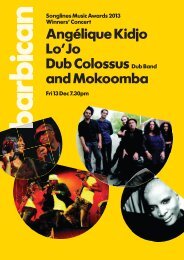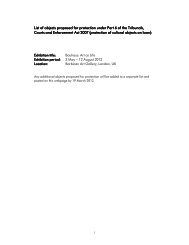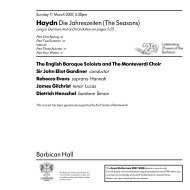You also want an ePaper? Increase the reach of your titles
YUMPU automatically turns print PDFs into web optimized ePapers that Google loves.
texts rather more, with the latter poised right<br />
on the edge of Victoriana, even as ‘dewdrops<br />
pearl the evening’s breast’. This is as close as<br />
<strong>Britten</strong> ever gets to Elgar: not quite pastiche<br />
perhaps, but certainly an affectionate echo.<br />
<strong>Britten</strong>’s mastery, however, lies in his<br />
juxtapositions. <strong>The</strong> ‘slimy root’ of Crabbe’s<br />
‘Marsh Flowers’ quickly reasserts nature’s<br />
muddier, uglier aspect, while anyone lingering<br />
over the tranquil beauty of Clare’s primrose<br />
finds themselves pulled up briskly by the<br />
impetuous energy of the ‘Ballad of Green<br />
Broom’, its witty, quasi-instrumental effects<br />
(recalling the Hymn to St Cecilia) imitating<br />
the limited range of a novice guitar or lute<br />
player. It’s a sophisticated joke to end a cycle<br />
of rare sincerity and sweetness from <strong>Britten</strong>.<br />
Composed in 1943, <strong>The</strong> Ballad of Little Musgrave<br />
and Lady Barnard is a concise masterpiece.<br />
<strong>Britten</strong> takes an anonymous ballad and morphs<br />
it into a sophisticated exercise in musical<br />
narrative. Set for the unusual ensemble of men’s<br />
voices and piano, the work was composed<br />
for officers in a German concentration<br />
camp, where it was performed during their<br />
incarceration. It’s a heady tale of lust, murder<br />
and revenge, in which Lord Barnard kills his<br />
wife and her lover. Each stage of the story<br />
is minutely wrought, from the tolling church<br />
bells of the opening (heard in the piano) that<br />
transform into the hooves of Barnard’s horse,<br />
to the duel between the two men, and finally<br />
the mourning song of the grieving husband.<br />
Coherence and continuity – of theme, music or<br />
treatment – may have characterised <strong>Britten</strong>’s<br />
earlier cycles, but Sacred and Profane is more<br />
interested in contrast and oppositions. <strong>The</strong><br />
conflict of the work’s title permeates this riotous,<br />
virtuosic work that celebrates the cultural<br />
collisions of medieval England. It’s as though<br />
the two choirs of the Hymn to the Virgin have<br />
come together as one, lurching artfully from<br />
the spiritual to the emphatically secular.<br />
It’s curious that so energetic a work (both in<br />
its vocal demands and the complexity of its<br />
invention) should have emerged so late in<br />
<strong>Britten</strong>’s career. By 1975 the composer was<br />
ill; heart surgery had prolonged his life but<br />
had also weakened him. Yet the same late<br />
surge that produced Death in Venice and the<br />
cantata Phaedra also yielded this choral cycle,<br />
composed for the five unaccompanied SSATB<br />
voices of Peter Pears’s Wilbye Consort. Writing<br />
for soloists rather than massed choral forces,<br />
<strong>Britten</strong> allows himself unusual freedom and<br />
range in constructing his vocal lines, and the<br />
effect is striking for its freewheeling athleticism.<br />
We open in pious mood; ‘St Godric’s Hymn’<br />
has the stark, declamatory intensity of a Poulenc<br />
motet, but soon regains its <strong>Britten</strong>ish flavour as<br />
harmonies thicken and meander. Before the<br />
prayer has a chance to rise up to heaven the<br />
animal cries and wails of ‘I mon waxe wod’<br />
break in – as vivid a musical evocation of<br />
madness as ever composed. <strong>The</strong> spiritual and<br />
secular collide directly in the vivid imagery of<br />
‘Lenten is come’, delighting in the wriggling,<br />
teeming signs of spring life, that are soon<br />
subdued by darkness in ‘<strong>The</strong> long night’. Sober<br />
meditation on Christ’s crucifixion (‘Yif ic of<br />
luve can’) is likewise interrupted by the pulsing<br />
babble of the ‘Carol’, just as Christ’s invitation<br />
to behold his death on the cross (‘Ye that pasen<br />
by’) has the rug pulled quickly from under it<br />
by the meticulous catalogue of human frailties<br />
of ‘A death’. Here, an old woman laboriously<br />
describes her bodily disintegration, facing<br />
death with a final insouciant bit of defiance:<br />
‘For the whole world I don’t care a jot!’ It’s a<br />
brave and heroic final stand from a composer<br />
whose own health was nearly exhausted,<br />
and who would be dead within a year.<br />
Programme note © Alexandra Coghlan<br />
6




